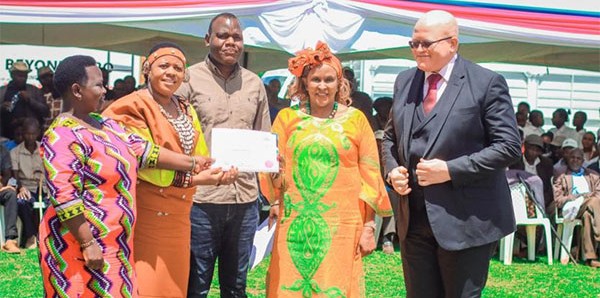Strength in Unity: Ending FGM and SGBV in Kenya
National Commemoration of the International Day of Zero Tolerance for FGM Maili Tatu Stadium, Meru County
In a powerful demonstration of unity and resolve, the National Gender and Equality Commission (NGEC), led by Commissioners Dr. Margaret Karungaru, Nzomo Mbithuka, and Caroline Lentumpuru, joined stakeholders and government officials at Maili Tatu Stadium in Meru County for the National Commemoration of the International Day of Zero Tolerance for Female Genital Mutilation (FGM).
This annual event, observed worldwide on 6th February, serves as a critical reminder of the urgent need to eliminate the harmful practice of FGM and combat the rising cases of Sexual and Gender-Based Violence (SGBV) in Kenya.
The commemoration was hosted by the Anti-FGM Board in partnership with key government agencies, civil society organisations, and local communities. Dignitaries in attendance included Dr. Aurelia Rono (Principal Secretary for Parliamentary Affairs), Anne Wang’ombe (Principal Secretary for Gender & Affirmative Action), and Meru Governor H.E. Kawira Mwangaza. Their presence underscored the Kenyan government’s commitment to ending FGM and SGBV through policy enforcement, community engagement, and collaborative action.
Amidst resounding messages of commitment and accountability, speakers at the event reinforced the urgent need for intensified efforts to eradicate FGM and tackle the increasing incidents of SGBV. Kenya has made significant strides in the fight against FGM, yet challenges persist, particularly in marginalised communities where the practice remains deeply rooted in cultural traditions.
Dr. Margaret Karungaru, emphasised the Commission’s unwavering stance against all forms of gender-based violence.
"The time for action is now. FGM is a violation of human rights, a threat to the dignity of women and girls, and a barrier to gender equality. We must strengthen enforcement mechanisms, empower communities through education, and ensure survivors receive justice and support."
The Principal Secretary for Gender and Affirmative Action, Anne Wang’ombe, echoed these sentiments, urging communities to reject harmful cultural norms that endanger the lives of women and girls.
"FGM is illegal in Kenya, and those who continue to practice it will face the full force of the law. We must work together— government agencies, community leaders, religious institutions, and young people—to end this cycle of violence."
Meru Governor Kawira Mwangaza reaffirmed her administration’s commitment to supporting survivors of FGM and SGBV through safe houses, psychosocial support, and economic empowerment programmes.
She further called upon traditional leaders and elders to champion the abandonment of FGM within their communities.
While Kenya has made remarkable progress in reducing FGM prevalence, the practice persists in some regions, particularly among pastoralist and border communities.
According to the Kenya Demographic and Health Survey (KDHS) 2022, the national prevalence of FGM stands at 15%, down from 38% in 1998. However, in some communities, rates remain alarmingly high—over 75% among the Somali, Samburu, Kisii, and Maasai populations.
Similarly, SGBV cases have been on the rise, with reports of domestic violence, rape, defilement, and femicide increasing across the country.
Data from the Kenya National Bureau of Statistics (KNBS) indicates that 45% of Kenyan women aged 15–49 have experienced physical or sexual violence. The COVID-19 pandemic further exacerbated this crisis, with lockdowns leading to a surge in cases and limited access to justice for survivors.
The fight against FGM and SGBV cannot be won through legislation alone—it requires grassroots involvement and cultural transformation. During the event, several survivors shared their harrowing experiences, urging young girls to resist societal pressures and speak out against harmful practices.
A highlight of the commemoration was the public declaration by reformed circumcisers, who pledged to abandon the practice and become anti-FGM champions in their communities. The event also saw the launch of community-led Alternative Rites of Passage (ARPs), which provide girls with a safe and culturally acceptable transition into womanhood without undergoing genital mutilation.
The International Day of Zero Tolerance for FGM serves as a stark reminder that the fight against gender-based violence is far from over. But with strength in unity, a firm commitment to legal enforcement, and community-driven advocacy, Kenya can realise a future where every girl grows up free from harm, discrimination, and violence.
NGEC Commissioners Nzomo Mbithuka, Dr Margaret Karungaru, and Caroline Lentupuru receive a certificate in recognition of NGEC’s unwavering commitment to public education on ending FGM.


Comments